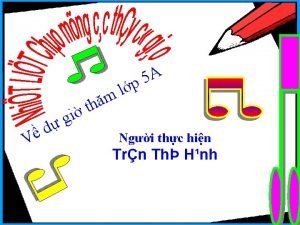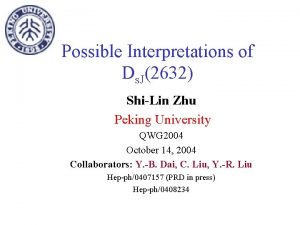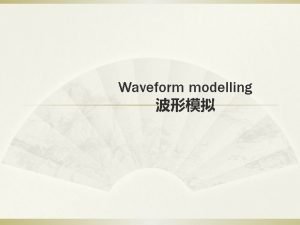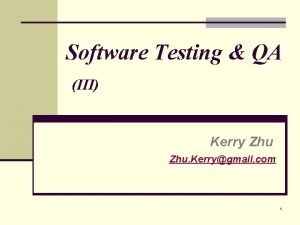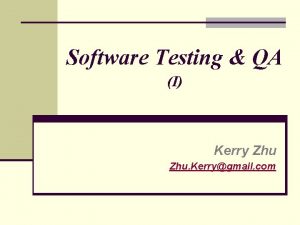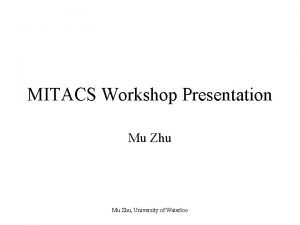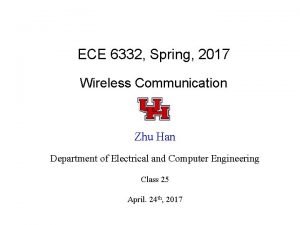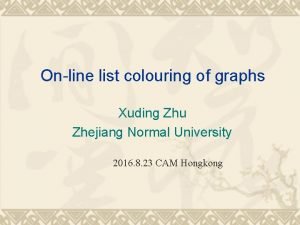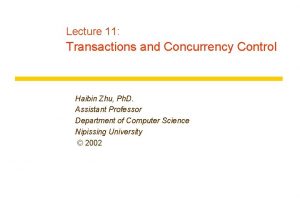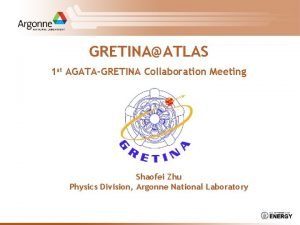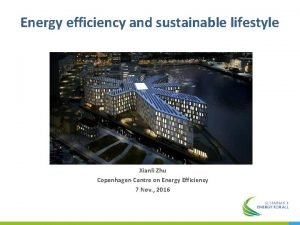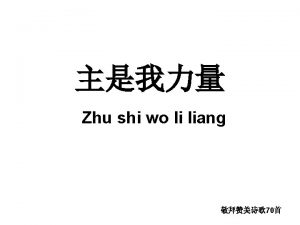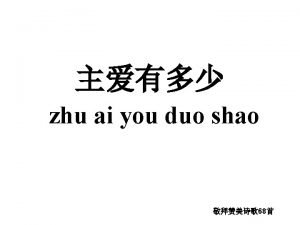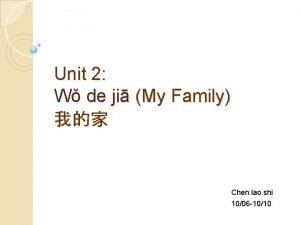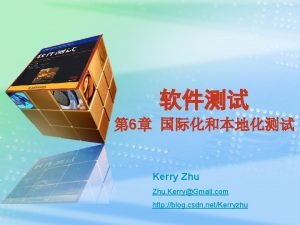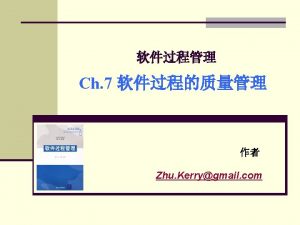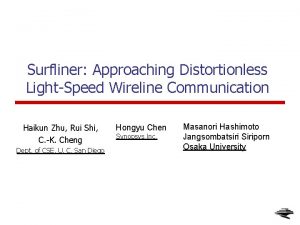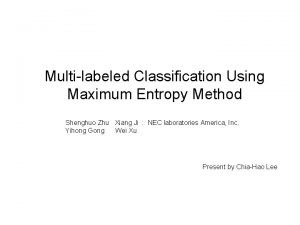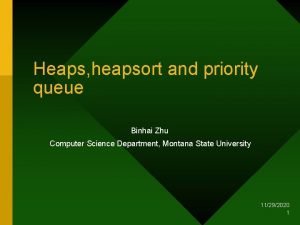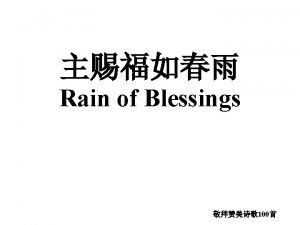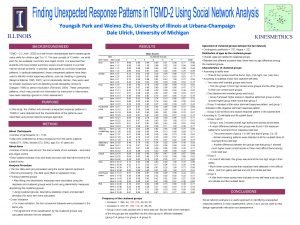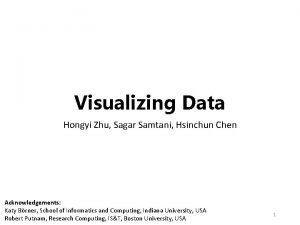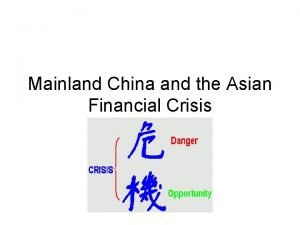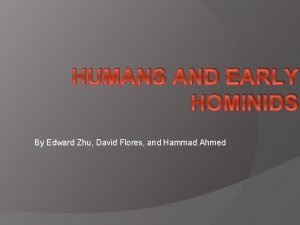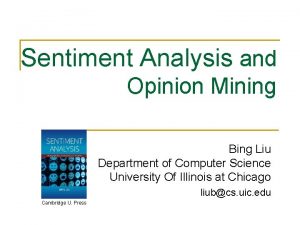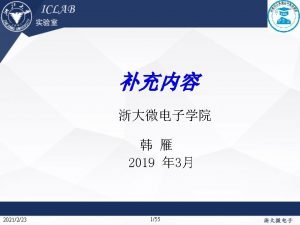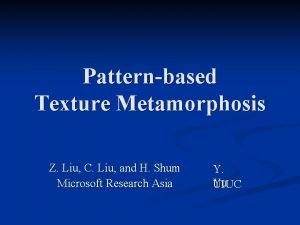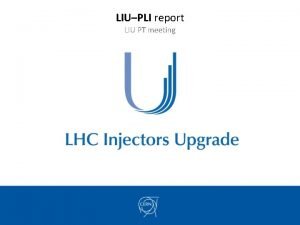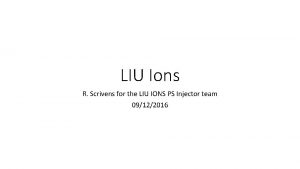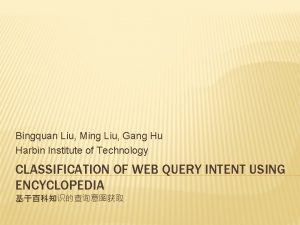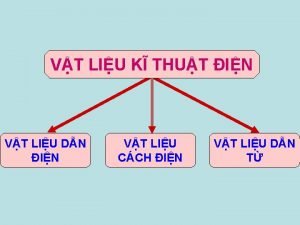Outline S C Zhu X Liu and Y







































- Slides: 39

Outline • S. C. Zhu, X. Liu, and Y. Wu, “Exploring Texture Ensembles by Efficient Markov Chain Monte Carlo”, IEEE Transactions On Pattern Analysis And Machine Intelligence, Vol. 22, No. 6, pp. 554 -569, 2000 10/27/2020 Computer Vision 1

Limitations of Linear Representations • Linear representations do not depend on the spatial relationships among pixels – For example, if we shuffle the pixels and corresponding representations, then the classification results will remain the same • But in images spatial relationships are important 10/27/2020 Computer Vision 2

Image Features 10/27/2020 Computer Vision 3

Spectral Representation of Images • Spectral histogram – Given a bank of filters F(a), a = 1, …, K, a spectral histogram is defined as the marginal distribution of filter responses 10/27/2020 Computer Vision 4

Spectral Representation of Images - continued • An example of spectral histogram 10/27/2020 Computer Vision 5

Image Modeling - continued • Given observed feature statistics {H(a)obs}, we associate an energy with any image I as • Then the corresponding Gibbs distribution is – The q(I) can be sampled using a Gibbs sampler or other Markov chain Monte-Carlo algorithms 10/27/2020 Computer Vision 6

Image Modeling - continued Image Synthesis Algorithm • Compute {Hobs} from an observed texture image • Initialize Isyn as any image, and T as T 0 • Repeat Randomly pick a pixel v in Isyn Calculate the conditional probability q(Isyn(v)| Isyn(-v)) Choose new Isyn(v) under q(Isyn(v)| Isyn(-v)) Reduce T gradually • Until E(I) < e 10/27/2020 Computer Vision 7

A Texture Synthesis Example Observed image 10/27/2020 Initial synthesized image Computer Vision 8

A Texture Synthesis Example Temperature Image patch Energy Conditional probability • 10/27/2020 Energy and conditional. Computer probability of the marked Vision pixel 9

A Texture Synthesis Example - continued • A white noise image was transformed to a perceptually similar texture by matching the spectral histogram 10/27/2020 Computer Vision 10 Average spectral histogram error

A Texture Synthesis Example - continued • Synthesized images from different initial conditions 10/27/2020 Computer Vision 11

Texture Synthesis Examples - continued Observed image Synthesized image • A random texture image 10/27/2020 Computer Vision 12

Texture Synthesis Examples - continued Observed image Synthesized image • An image with periodic structures 10/27/2020 Computer Vision 13

Texture Synthesis Examples - continued Mud image Synthesized image • A mud image with some animal foot prints 10/27/2020 Computer Vision 14

Texture Synthesis Examples - continued Observed image Synthesized image • A random texture image with elements 10/27/2020 Computer Vision 15

Texture Synthesis Examples - continued Observed image Synthesized image • An image consisting of two regions – Note that wrap-around boundary conditions were used 10/27/2020 Computer Vision 16

Texture Synthesis Examples - continued Synthesized image Original cheetah skin patch • A cheetah skin image 10/27/2020 Computer Vision 17

Texture Synthesis Examples - continued Observed image Synthesized image • An image consisting of circles 10/27/2020 Computer Vision 18

Texture Synthesis Examples - continued Observed image Synthesized image • An image consisting of crosses 10/27/2020 Computer Vision 19

Texture Synthesis Examples - continued Observed image Synthesized image • A pattern with long-range structures 10/27/2020 Computer Vision 20

Object Synthesis Examples • As in texture synthesis, we start from a random image • In addition, similar object images are used as boundary conditions in that the corresponding pixel values are not updated during sampling process 10/27/2020 Computer Vision 21

Object Synthesis Examples - continued 10/27/2020 Computer Vision 22

Object Synthesis Examples - continued 10/27/2020 Computer Vision 23

Linear Transformations of Images • Linear transformations include – – – Principal component analysis Independent component analysis Fisher discriminant analysis Optimal component analysis They have been widely used to reduce dimension of images for appearance-based recognition applications • Each image is viewed as a long vector and projected into a set of bases that have certain properties 10/27/2020 Computer Vision 24

Principal Component Analysis • Defined with respect to a training set such that the average reconstruction error is minimized 10/27/2020 Computer Vision 25

Principal Component Analysis - continued 10/27/2020 Computer Vision 26

Eigen Values of 400 Eigen Vectors 10/27/2020 Computer Vision 27

Principal Component Analysis - continued Original Image 10/27/2020 Reconstructed using 50 PCs Computer Vision Reconstructed using 200 PCs 28

Principal Component Analysis - continued • Is PCA representation a good representation of images for recognition in that images that have similar principal representations are similar? – Image generation through sampling – Roughly speaking, we try to generate images that have the given coefficients along PCs 10/27/2020 Computer Vision 29

Principal Component Analysis - continued 10/27/2020 Computer Vision 30

Principal Component Analysis - continued 10/27/2020 Computer Vision 31

Difference Between Reconstruction and Sampling Reconstruction is not sufficient to show the adequacy of a representation and sampling from the set of images with same representation is more informational 10/27/2020 Computer Vision 32

Object Recognition Experiments • We compare linear methods in the methods including – – Principal component analysis (PCA) Independent component analysis (ICA) Fisher discriminant analysis (FDA) Random component analysis (RCA) • For fun and to show the actual gain of using different bases is relatively small • Corresponding linear methods in the spectral histogram space including – SPCA, SICA, SFDA, and SRCA 10/27/2020 Computer Vision 33

COIL Dataset 10/27/2020 Computer Vision 34

3 D Recognition Results 10/27/2020 Computer Vision 35

Experimental Results - continued • To further demonstrate the effectiveness of our method for different types of images, we create a dataset of combining the texture dataset, face dataset, and COIL dataset, resulting in a dataset of 180 categories with 10160 images in total 10/27/2020 Computer Vision 36

Linear Subspaces of Spectral Representation 10/27/2020 Computer Vision 37

Experimental Results - continued • Combined dataset – continued – Not only the recognition rate is very good, but also it is very reliable and robust, as the average entropy of the p 0(i|I) is 0. 60 bit (The corresponding uniform distribution’s entropy is 7. 49 bits) 10/27/2020 Computer Vision 38

Experimental Results - continued • Combined dataset – continued – Not only the recognition rate is very good, but also it is very reliable and robust, as the average entropy of the p 0(i|I) is 0. 60 bit (The corresponding uniform distribution’s entropy is 7. 49 bits) Entropy=6. 78 bits Entropy=0. 60 bit 10/27/2020 Computer Vision 39
 Lean office definition
Lean office definition Alex liu cecilia liu
Alex liu cecilia liu Líu líu lo lo ta ca hát say sưa
Líu líu lo lo ta ca hát say sưa What is a quote sandwich
What is a quote sandwich Ds peking
Ds peking Lupei zhu
Lupei zhu Zhe yi sheng zui mei de zhu fu lyrics
Zhe yi sheng zui mei de zhu fu lyrics Internationalization testing checklist
Internationalization testing checklist Kerry zhu
Kerry zhu Man wo
Man wo Axing zhu
Axing zhu Mu zhu waterloo
Mu zhu waterloo Zhu han
Zhu han Xuding zhu
Xuding zhu Haibin zhu
Haibin zhu Shaofei zhu
Shaofei zhu Xianli zhu
Xianli zhu Zhu shi
Zhu shi Zhu en
Zhu en Zhù nǐ shēng rì kuài lè
Zhù nǐ shēng rì kuài lè Alae vs ulae
Alae vs ulae Dou mei zhu
Dou mei zhu Kerry zhu
Kerry zhu Kerry zhu
Kerry zhu Ha li lu ya
Ha li lu ya Haikun zhu
Haikun zhu Shenghuo zhu
Shenghuo zhu Mechanical engineering umbc
Mechanical engineering umbc Zhu
Zhu Zhu
Zhu The region yu wo
The region yu wo Weimo zhu
Weimo zhu Sagar samtani
Sagar samtani Zhu rongji
Zhu rongji Heidelbergensis
Heidelbergensis Kerry zhu
Kerry zhu Lucy liu with my girl drew
Lucy liu with my girl drew Opinion definition
Opinion definition Diane liu md
Diane liu md Chiu-chu liu
Chiu-chu liu


